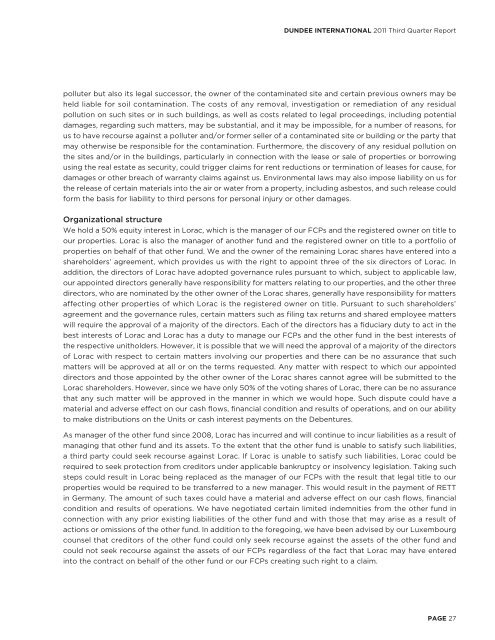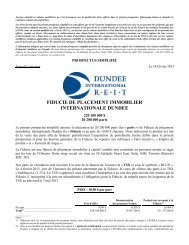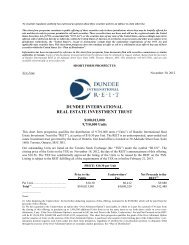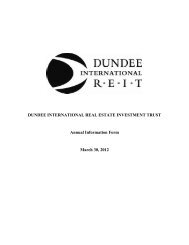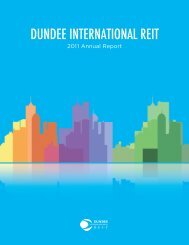DUNDEE INTERNATIONAL REIT
DUNDEE INTERNATIONAL REIT
DUNDEE INTERNATIONAL REIT
You also want an ePaper? Increase the reach of your titles
YUMPU automatically turns print PDFs into web optimized ePapers that Google loves.
<strong>DUNDEE</strong> <strong>INTERNATIONAL</strong> 2011 Third Quarter Report<br />
polluter but also its legal successor, the owner of the contaminated site and certain previous owners may be<br />
held liable for soil contamination. The costs of any removal, investigation or remediation of any residual<br />
pollution on such sites or in such buildings, as well as costs related to legal proceedings, including potential<br />
damages, regarding such matters, may be substantial, and it may be impossible, for a number of reasons, for<br />
us to have recourse against a polluter and/or former seller of a contaminated site or building or the party that<br />
may otherwise be responsible for the contamination. Furthermore, the discovery of any residual pollution on<br />
the sites and/or in the buildings, particularly in connection with the lease or sale of properties or borrowing<br />
using the real estate as security, could trigger claims for rent reductions or termination of leases for cause, for<br />
damages or other breach of warranty claims against us. Environmental laws may also impose liability on us for<br />
the release of certain materials into the air or water from a property, including asbestos, and such release could<br />
form the basis for liability to third persons for personal injury or other damages.<br />
Organizational structure<br />
We hold a 50% equity interest in Lorac, which is the manager of our FCPs and the registered owner on title to<br />
our properties. Lorac is also the manager of another fund and the registered owner on title to a portfolio of<br />
properties on behalf of that other fund. We and the owner of the remaining Lorac shares have entered into a<br />
shareholders’ agreement, which provides us with the right to appoint three of the six directors of Lorac. In<br />
addition, the directors of Lorac have adopted governance rules pursuant to which, subject to applicable law,<br />
our appointed directors generally have responsibility for matters relating to our properties, and the other three<br />
directors, who are nominated by the other owner of the Lorac shares, generally have responsibility for matters<br />
affecting other properties of which Lorac is the registered owner on title. Pursuant to such shareholders’<br />
agreement and the governance rules, certain matters such as filing tax returns and shared employee matters<br />
will require the approval of a majority of the directors. Each of the directors has a fiduciary duty to act in the<br />
best interests of Lorac and Lorac has a duty to manage our FCPs and the other fund in the best interests of<br />
the respective unitholders. However, it is possible that we will need the approval of a majority of the directors<br />
of Lorac with respect to certain matters involving our properties and there can be no assurance that such<br />
matters will be approved at all or on the terms requested. Any matter with respect to which our appointed<br />
directors and those appointed by the other owner of the Lorac shares cannot agree will be submitted to the<br />
Lorac shareholders. However, since we have only 50% of the voting shares of Lorac, there can be no assurance<br />
that any such matter will be approved in the manner in which we would hope. Such dispute could have a<br />
material and adverse effect on our cash flows, financial condition and results of operations, and on our ability<br />
to make distributions on the Units or cash interest payments on the Debentures.<br />
As manager of the other fund since 2008, Lorac has incurred and will continue to incur liabilities as a result of<br />
managing that other fund and its assets. To the extent that the other fund is unable to satisfy such liabilities,<br />
a third party could seek recourse against Lorac. If Lorac is unable to satisfy such liabilities, Lorac could be<br />
required to seek protection from creditors under applicable bankruptcy or insolvency legislation. Taking such<br />
steps could result in Lorac being replaced as the manager of our FCPs with the result that legal title to our<br />
properties would be required to be transferred to a new manager. This would result in the payment of RETT<br />
in Germany. The amount of such taxes could have a material and adverse effect on our cash flows, financial<br />
condition and results of operations. We have negotiated certain limited indemnities from the other fund in<br />
connection with any prior existing liabilities of the other fund and with those that may arise as a result of<br />
actions or omissions of the other fund. In addition to the foregoing, we have been advised by our Luxembourg<br />
counsel that creditors of the other fund could only seek recourse against the assets of the other fund and<br />
could not seek recourse against the assets of our FCPs regardless of the fact that Lorac may have entered<br />
into the contract on behalf of the other fund or our FCPs creating such right to a claim.<br />
PAGE 27


